Related Research Articles

Slide guitar is a technique for playing the guitar that is often used in blues music. It involves playing a guitar while holding a hard object against the strings, creating the opportunity for glissando effects and deep vibratos that reflect characteristics of the human singing voice. It typically involves playing the guitar in the traditional position with the use of a slide fitted on one of the guitarist's fingers. The slide may be a metal or glass tube, such as the neck of a bottle, giving rise to the term bottleneck guitar to describe this type of playing. The strings are typically plucked while the slide is moved over the strings to change the pitch. The guitar may also be placed on the player's lap and played with a hand-held bar.
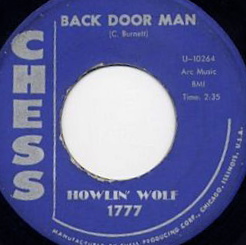
"Back Door Man" is a blues song written by American musician Willie Dixon and recorded by Howlin' Wolf in 1960. The lyrics draw on a Southern U.S. cultural term for an extramarital affair. The song is one of several Dixon-Wolf songs that became popular among rock musicians, including the Doors who recorded it for their 1967 self-titled debut album.

"Goin' Down Slow" or "Going Down Slow" is a blues song composed by American blues singer St. Louis Jimmy Oden. It is considered a blues standard and "one of the most famous blues of all".
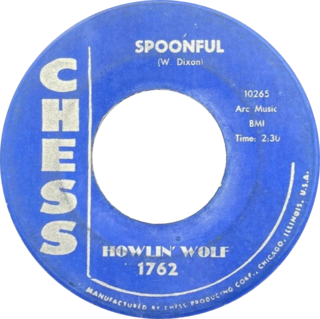
"Spoonful" is a blues song written by Willie Dixon and first recorded in 1960 by Howlin' Wolf. Called "a stark and haunting work", it is one of Dixon's best known and most interpreted songs. Etta James and Harvey Fuqua had a pop and R&B record chart hit with their duet cover of "Spoonful" in 1961, and it was popularized in the late 1960s by the British rock group Cream.

"Killing Floor" is a 1964 song by American blues singer-songwriter and guitarist Howlin' Wolf. Called "one of the defining classics of Chicago electric blues", "Killing Floor" became a blues standard with recordings by various artists. It has been acknowledged by the Blues Foundation Hall of Fame, which noted its popularity among rock as well as blues musicians. English rock group Led Zeppelin adapted the song for their "The Lemon Song", for which Howlin' Wolf is named as a co-author.

"Smokestack Lightning" is a blues song recorded by Howlin' Wolf in 1956. It became one of his most popular and influential songs. It is based on earlier blues songs, and numerous artists later interpreted it.

"Rollin' Stone" is a blues song recorded by Muddy Waters in 1950. It is his interpretation of "Catfish Blues", a Delta blues that dates back to 1920s Mississippi. "Still a Fool", recorded by Muddy Waters a year later using the same arrangement and melody, reached number nine on the Billboard R&B chart. "Rollin' Stone" has been recorded by a variety of artists.

"Rollin' and Tumblin'" is a blues standard first recorded by American singer-guitarist Hambone Willie Newbern in 1929. Called a "great Delta blues classic", it has been interpreted by hundreds of Delta and Chicago blues artists, including well-known recordings by Muddy Waters. Rock musicians usually follow Waters' versions, with the 1960s group Cream's rendition being perhaps the best known.
"Wang Dang Doodle" is a blues song written by Willie Dixon. Music critic Mike Rowe calls it a party song in an urban style with its massive, rolling, exciting beat. It was first recorded by Howlin' Wolf in 1960 and released by Chess Records in 1961. In 1965, Dixon and Leonard Chess persuaded Koko Taylor to record it for Checker Records, a Chess subsidiary. Taylor's rendition quickly became a hit, reaching number thirteen on the Billboard R&B chart and number 58 on the pop chart. "Wang Dang Doodle" became a blues standard and has been recorded by various artists. Taylor's version was added to the United States National Recording Registry in 2023.

"Sitting on Top of the World" is a country blues song written by Walter Vinson and Lonnie Chatmon. They were core members of the Mississippi Sheiks, who first recorded it in 1930. Vinson claimed to have composed the song one morning after playing at a white dance in Greenwood, Mississippi. It became a popular crossover hit, and was inducted into the Grammy Hall of Fame in 2008.

"Little Red Rooster" is a blues standard credited to arranger and songwriter Willie Dixon. The song was first recorded in 1961 by American blues musician Howlin' Wolf in the Chicago blues style. His vocal and slide guitar playing are key elements of the song. It is rooted in the Delta blues tradition and the theme is derived from folklore. Musical antecedents to "Little Red Rooster" appear in earlier songs by blues artists Charlie Patton and Memphis Minnie.
"One Way Out" is a blues song that was recorded in the early 1960s by both Sonny Boy Williamson II and Elmore James. A reworking of the song by G. L. Crockett, titled "It's a Man Down Here", appeared on the Billboard record charts in 1965. In 1971, the Allman Brothers Band recorded an updated live version of the song, which was included on their popular Eat a Peach album (1972).

Hoodoo Man Blues is the debut album of blues vocalist and harmonica player Junior Wells, performing with the Junior Wells' Chicago Blues Band, an early collaboration with guitarist Buddy Guy. Released on LP by Delmark Records in November 1965, the album has been subsequently reissued on CD and LP by Delmark and Analogue Productions.

"Evil", sometimes listed as "Evil (Is Going On)", is a Chicago blues song written by Willie Dixon. Howlin' Wolf recorded the song in Chicago for Chess Records in 1954. It was included on the 1959 compilation album Moanin' in the Moonlight. When he re-recorded it for The Howlin' Wolf Album in 1969, "Evil" became Wolf's last charting single, reaching number 43 Billboard R&B chart.

"Forty-Four" or "44 Blues" is a blues standard whose origins have been traced back to early 1920s Louisiana. However, it was Roosevelt Sykes, who provided the lyrics and first recorded it in 1929, that helped popularize the song. "Forty-Four," through numerous adaptations and recordings, remains in the blues lexicon eighty years later.
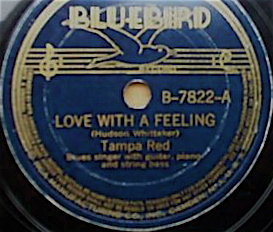
"You've Got to Love Her with a Feeling", or "Love with a Feeling" as it was originally titled, is a blues song first recorded by Tampa Red in 1938. Numerous blues artists have interpreted and recorded the song, making it a blues standard. When Freddie King adapted it in 1961, it became his first single to appear in the record charts.
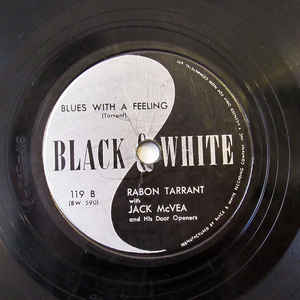
"Blues with a Feeling" is a blues song written and first recorded by Rabon Tarrant with Jack McVea and His All Stars in 1947, as the B-side of "Slowly Goin' Crazy Blues". Although the original release was commercially unsuccessful, the song later became an important hit for Little Walter, with whom it is usually identified.
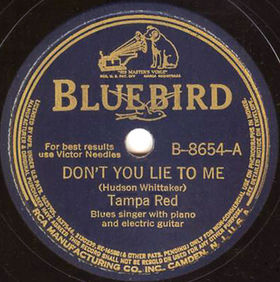
"Don't You Lie to Me" is a song recorded by Tampa Red in 1940. It became popular with blues artists, leading it to become a blues standard. The song was also interpreted by rock and roll pioneers Fats Domino and Chuck Berry.
"Sugar Mama" or "Sugar Mama Blues" is a blues standard. Called a "tautly powerful slow blues" by music journalist Charles Shaar Murray, it has been recorded by numerous artists, including early Chicago bluesmen Tampa Red, Sonny Boy Williamson I, and Tommy McClennan. John Lee Hooker and Howlin' Wolf later adapted "Sugar Mama" for electric blues and rock group Led Zeppelin reworked it during early recording sessions.
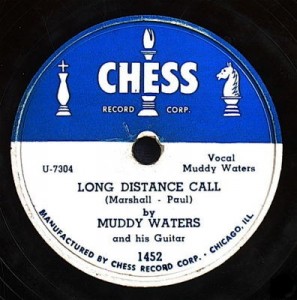
"Long Distance Call" is a song by American blues musician Muddy Waters. It was first released as a single in 1951 by Chess Records (#1452), with "Too Young To Know" on the B-side. The single reached #8 on the US R&B chart. It was later released on the greatest hits album The Best of Muddy Waters (1958), and is hailed as a classic modern blues song; Waters's singing is cited as an excellent example of blue notes.
References
- ↑ Evans, David (1987). Big Road Blues: Tradition and Creativity in the Folk Blues. Da Capo Press. ISBN 0-306-80300-3.
- 1 2 Palmer, Robert (1981). Deep Blues . Penguin Books. p. 46. ISBN 978-0-14-006223-6.
- 1 2 Herzhaft, Gerard (1992). "Poor Boy". Encyclopedia of the Blues. Fayetteville, Arkansas: University of Arkansas Press. p. 466. ISBN 1-55728-252-8.
- 1 2 Leggett, Steve. "Gus Cannon: Complete Recorded Works, Vol. 1 (1927-1928) –Review". AllMusic . Retrieved May 19, 2021.
- ↑ "Sitting on Top of the World" / "Poor Boy" (Single notes). Howlin' Wolf. Chicago: Chess Records. 1957. Record labels. 1679.
{{cite AV media notes}}: CS1 maint: others in cite AV media (notes) (link)